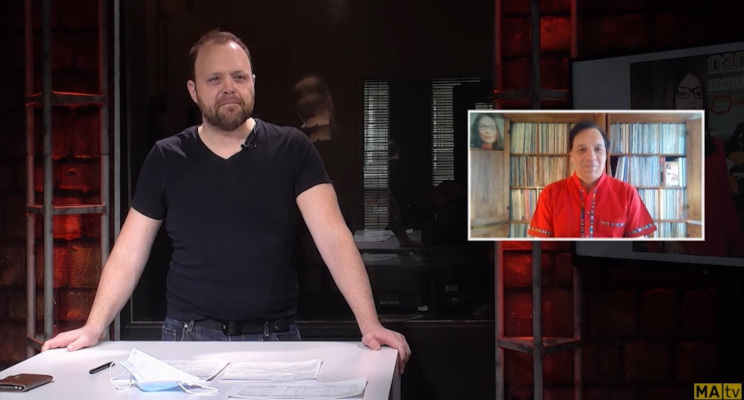
AgorA
Season 8 - 23.
Nana Mouskouri
First broadcast: April 8, 2022
MAtv Sorel-Tracy
 |
AgorA Season 8 - 23. Nana Mouskouri |
(interview with André Champagne)
André: On AgorA this week, on MAtv Sorel-Tracy, two enthusiasts: a lady involved for 20 years for the Orienthèque and a die-hard fan of Nana Mouskouri. In thirty seconds.
Let's go for our interviews today. On AgorA, we often received people who liked things, professions, activities. Here, we have someone who loves someone. I think it's the first time. We are with Stéphane Robert who is passionate about Nana Mouskouri. Hi Stephane.
Stéphane: Hello André.
André: Thank you very much for accepting the invitation.
I have some idols. So, I understand what is having an idol. And you, it’s Nana Mouskouri.
Stéphane: Yes, for several years. So, you would like me to tell you a bit about it?
André: Of course. I would like that. I know it all started with a record at Christmas, I think.
Stéphane: Yes. It was in 1970, but before Christmas. It is thanks to one of my aunts who lived with us. She had gone shopping in Montreal and bought an album at Archambault. Since the record player was in my bedroom, she didn't want to wake me up and she left it on the washing machine. In the morning, I discovered it and I felt like I knew that woman. But where could I have seen her? It was not possible and it always intrigued me. So my aunt unsealed the record and played it. Finally, she gave it to me. Then, at Christmas, she offered me another Nana album. When we are children, our tastes change, but I continued to listen to her. After that, my parents bought me Nana records when I had good school reports to encourage me because they knew I would listen to them.
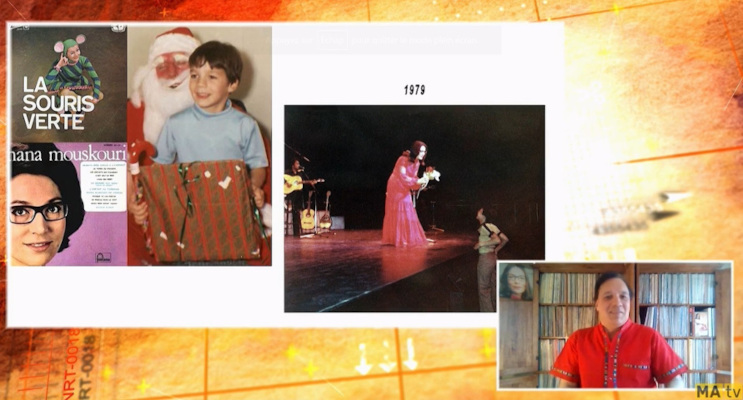
Later, in 1974, when I found out that she was coming to Place des Arts in Montreal, the four of us were able to go there. I had the chance to meet her in the backstage. I think she was impressed talking with a nine-year-old boy who told her he had all her records and was interested in her music, especially when we’re thirty years apart.
André: Especially since, in my opinion, those who went to see her backstage were mostly gentlemen of her age. No?
Stéphane: Maybe. Or people who follow her music a lot. There are all ages. Then I went back to see her every time she came.
I always wanted to satisfy my curiosity to get to know this woman. So, I started to do research. When I was older, I went to universities and libraries. In fact, I spent three months at the Library of Congress in Washington to find show dates and learn more about her. Then, I put the articles in scrapbooks and I wrote down the new details I discovered in booklets. It's like a big puzzle and every time I find a missing piece, I'm very proud.
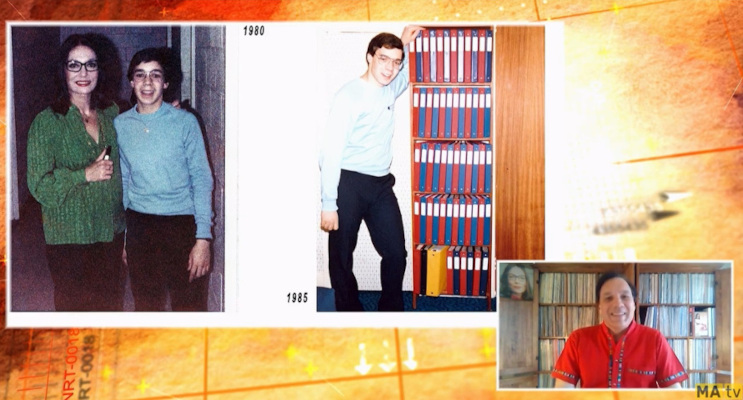
For those who know more or less who Nana Mouskouri is, she is a Greek who started singing in her country. She has a background in classical singing. Afterwards, she fell in love with jazz. It didn't go with classical music. So she started making a living in clubs singing jazz. But she met great intellectuals who wanted to write songs for her. They said to her: «Nana, if you want to become a good singer, you must first know Greek songs well.» After that, she did French. Since then, she is a polyglot and sings phonetically in 27 languages. It is an example for me who wanted to learn other languages.
Also, she is an endearing personality because she represents stability: she is always the same with her dark glasses and her hair parted in the middle. I think it is an ideal that is sought after a lot today. In addition, she is a perfectionist and she is classy in interviews and on stage. She is also the woman without scandal despite her celebrity and I have always had admiration for that.
Of course, I continue to collect newspaper articles to find out more and to buy records. By the way, you have a part of it here. These are the 33 rpm. I have more than 1,500. And that's apart from the other 1,500 which are CDs, cassettes and 45 rpm. Basically, all the pieces that leave traces of what she was and what she still is today.

André: At some point, there was a change. It was from the moment you bought a computer. Because we haven't said it yet, but you manage a very very important website on Nana Mouskouri.
Stéphane: Ah, yes, computers…We already had the opportunity to talk about it. For me, it's a little bit my pet peeve. But in the years 1997, 1998, I had read that those who did not know how to use a computer were going to be the illiterates of the year 2000. So, I had to get started.
At first, I did not do it for fun because I am a concrete person. I like to have a piece of paper, a record in my hands. I am suspicious of the virtual because if the device does not work, we don’t have it anymore. I started by making my list of records because it needed to be updated continuously. It was so long. With the computer, it was much easier thanks to Excel. And after that, I began to write texts on Word. Then, I saw a little bit what was happening on the Internet. I saved the photos of Nana that I found, I wrote down the details that I didn't know, as if they were going to be useful to me for rewriting her life. It was the beginning of the computer and the Internet.
André: And now, the website, we’re talking about a million visitors?
Stéphane: For 17 years, it's 1,100,000 visitors. Of course, it didn't happen all at once. The decision to make a website came at a certain point in my life. Nana, I listen to her when I'm writing texts, when I'm doing something else. It's a background music that doesn't bother you. But at some point, it wasn't just that. After doing some research, I said to myself that maybe it had to lead to something one day: to share this passion, to make this woman known, the music she left us by making a website, by example.
If someone had told me that twenty years ago, I would never have thought I could do it because I was afraid of computers. But someone helped me to set it up. And slowly, I looked at what was being done elsewhere. But I wanted to do it in a personal way. It is called the Quebec site of Nana Mouskouri because she has ties in Quebec that she does not have elsewhere. I take as an example Céline Dion who is a very good singer and who has a great career. But what she does in French and English is known everywhere. While in Germany, Nana released about twenty albums unknown elsewhere. She had her German career. In Greece, the same thing. And then, she established her roots in several countries. They are not the same. In Quebec, she came often. Her first solo tour took place in 1967. After that, she did the same across the world. And the year 1967 was a turning point for her career and also for what happened in Quebec at that time. So, it is as if their destinies had crossed. These are things I wanted to raise, just like the contacts she had with Quebecers. I am also thinking of Jean-Pierre Ferland's song, "Je reviens chez nous", which she has recorded in seven languages. Each article gives me ideas to write others. It's like there's never an end.
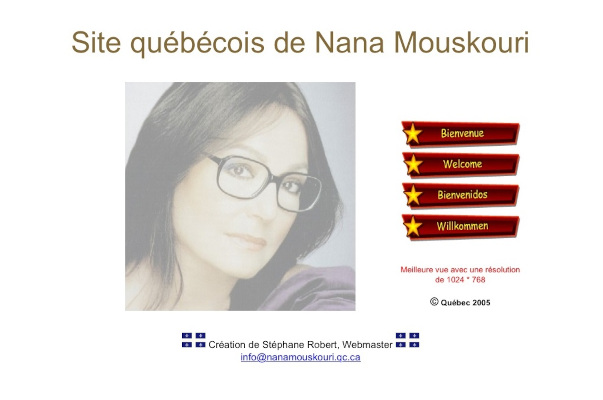
André: Whenever I speak with someone who has an idol and has met him/her, I can't help but ask the question: Did he/she disappoint you? Because I have already met people that I liked very much when I was younger and then it was not always the moment that I would have wanted. Here, we saw scrolling images of you with her. So, obviously, you have met her often, you know her a little. Finally, how much? Does she know your name?
Stéphane: She knows me by sight for a very, very long time. It was very long before she knew my name because she meets a lot of people. I don't see her often enough to have a very very close relationship. But I know her entourage, her musicians who tell her about me, who send her the links of my new articles. So she reads them and enjoys them.
I had surprises when I went to see her in 2012 in Germany. It was for the 50th anniversary of her famous song "The white rose of Athens" which started her career with a million records. I tell you:
I get there in Nuremberg where I have to join my German friends at the hotel. No poster of the show and I don't know anyone. Am I in the wrong place? Finally, I locate the theater which is not very far. So I sit in the lobby. And at some point, I see the bus of Nana's troupe coming. There, I see the musicians getting off. I say hello to them. And Nana arrives. So I go to see her and she exclaims: «Ah, it's the Canadian.» Then she starts singing: "Un Canadien errant banni de ses foyers parcourait en pleurant des pays étrangers…" (A wandering Canadian banished from his hearths traveled, weeping, through foreign countries). So it's quite a surprise.
During one of these concerts, I was on the balcony just over the stage. She saw me and waved at me. It must also be said that in Germany, it is very different from here because during the encores, the fans approach the stage. When I was near, she wanted to give me the microphone so that I could sing "Weiße Rosen aus Athen" with her. Of course, I know the refrain in German, but not the couplets. I would have had to do it in French. So I couldn't.
After that, in 2018, she invited me to attend a master class she was giving at McGill University. She had to listen to four tenors and sopranos who were studying there and give them some tips. I wrote an article about it. I was accompanied by all her musicians: the drummer, the bassist, the guitarist, the pianist and her assistant. It was a nice experience. Every time I attend a concert, I try to see her, but it's not always easy. If she receives people every night, that's a lot. If she receives one, she must receive ten. However, I have met her several times.

André : We know she's an international star, but we're just talking broadly. How many albums has she sold in her lifetime?
Stéphane: It's quite difficult to know because they give all kinds of figures. We say 300 million albums. 300 million recordings, I would believe it because she did a lot of records, about 2,000 recordings, songs in several languages. So an album that contains twelve songs would count as twelve. That's what I believe they have counted. It must be said that she has known all eras. At the beginning, it was the 45 rpm with two songs, the EPs with four songs, the 33 rpm. There were CDs. Now it's mp3 download. So, yes, we could say 300 million recordings.
André: I know that you are a teacher here in Sorel-Tracy and that you have already made an oral presentation on your passion for Nana Mouskouri to break the ice in a class. Young people today had probably never heard of her, I imagine.
Stéphane: Not a lot. The minority. Maybe one in five. But I think they were curious. It was a group of secondary 2 and they were affraid to talk in front of the class. So I said to them: «Listen, talking about your hobby for two minutes, something you like, it’s not difficult». As some students were scheduled and very nervous, I decided that I was going to made my presentation. I started telling them that in 1970 I had my first record. How old was I? Five years old. In 1974, the first time I saw her, I was nine years old. When I started doing a lot of research in libraries, in 1983, I was 18 years old. Finally, I showed them this. Then, I got beautiful testimonies, beautiful messages. There is one who told me that it served as an example to her, that it is important to cling to something in life. That only real passions go back a long way, to childhood and that lasts a lifetime. We must keep them alive, they are ultimately reasons to live. Otherwise, life is boring.
André: I find it interesting because young people today are mostly hooked on small screens. Then, it may be less nourishing than what you do.
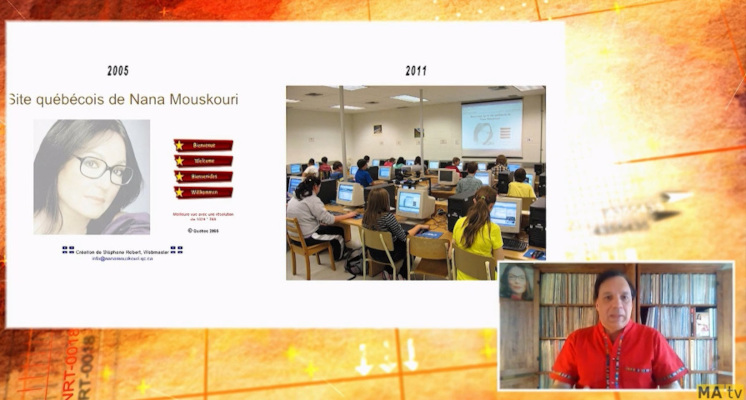
André: Time flies. Nana Mouskouri came to Sorel-Tracy. That’s no small feat.
Stéphane: Ah, yes, I told you that. She came three times during the years when many artists like Jacques Brel, Juliette Gréco and Michel Sardou performed at the Théâtre Sorel. It was the most comfortable theater of those years. Unfortunately, it has not been preserved. But she came to sing here, among others the last time, on October 13, 1970. It was on her 36th birthday. Obviously, I was very young. I knew who she was, but no one told me. They gave her a cake and flowers to thank her. She was very, very moved by that. Even today, it saddens me. I tell myself that she came six blocks from my house without me being able to go there. But I have seen her in Germany, Greece, Spain, France and the United States. So, I still have a little nostalgia for that.
André: Maybe there are people my age or younger who don't suspect it, but our technicians often tell me about the time when there were big world stars who came to the Théâtre Sorel. They gave me the same names as you. So I'm beginning to believe them.

André: We have one minute left. Is there a Nana Mouskouri community in Quebec? Do you have acquaintances who like her as much as you do?
Stéphane: There are others following her. We don't see each other so much, but we write to each other. Online is easier. As my site is visited in more than a hundred countries, I have contacts around the world.
André: Your site is in English, French…
Stéphane: In Spanish and German.
André: Oh! OK.
Stéphane: I wanted to do something that looks like Nana. As she is a polyglot, it had to be in several languages. And the fact that I write all my texts makes it more personal.
André: Stéphane, that's all the time we have. But I thank you very much. It's super interesting. It makes me want to listen to Nana Mouskouri. Thank you so much.
Stéphane: Thank you very much for allowing me to speak a little bit because I don't have the opportunity to do so very often.
André: It is a pleasure for me. So, maybe there are people who will also discover a passion for Nana Mouskouri thanks to you.